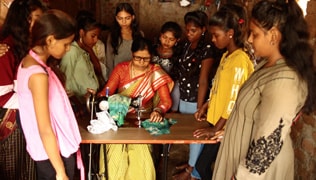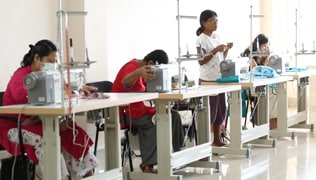- Home/
- Stories
Stories
Empowering Women Through Solar Innovation: A Modern-Day Miracle in Uttar Pradesh's Shravasti
Team NDTV | Thursday December 07, 2023A modern-day miracle is happening in Uttar Pradesh's Shravasti, where Usha, SIDBI and Tata Power have joined hands to empower hundreds of women through solar innovation
- Team NDTV | Wednesday December 06, 2023
The Usha Silai School initiative in Dholka, Gujarat, stands as a shining example of how environmental consciousness and women empowerment can go hand in hand
- Team NDTV | Tuesday December 05, 2023
In Meghalaya's Mairang village, the USHA Training Cum Production Centre is making significant strides in empowering women through training while also promoting sustainability
- Team NDTV | Monday December 04, 2023
Meghalaya's Mawlynnong village is a hub for women's empowerment. The Usha Training Cum Production Center is equipping local women with skills to create marketable products, fostering economic growth. With a unique blend of tradition, cleanliness, and empowered women, Mawlynnong is more than just a picturesque village it's a community on the rise.
- Team NDTV | Thursday November 30, 2023
Under Usha's Silai School initiative, women are gaining financial independence. Vandana Gadag, a tribal woman residing in the underdeveloped village of Velugam, Dadra and Nagar Haveli, achieved financial autonomy by starting her small-scale enterprise
- Team NDTV | Thursday November 30, 2023
The women of the Toda tribe practice an ancient form of embroidery which is deeply intertwined with their culture and heritage
- Team NDTV | Wednesday November 29, 2023
To keep Khneng embroidery alive and empower women, the Meghalaya State Rural Livelihoods Society (MSRLS) has joined hands with Usha International Limited
- Team NDTV | Thursday November 23, 2023
The East India Fashion Week featured over 30 designers, which gave the women of the Usha Silai school an opportunity to connect with industry experts, helping them get a sense of the fashion industry
- Team NDTV | Friday January 13, 2023
USHA hopes they will be able to capitalise on this advantage and that their continued intervention will turn Puducherry into a strong contender in the silambam circuit of India
- Team NDTV | Wednesday January 11, 2023
USHA has been persistently promoting local traditions and culture around the country, whether through traditional forms of art and craft or indigenous forms of spor
Adopt a Silai School
About the Initiative

Kushalta Ke Kadam, an initiative by USHA Silai School and NDTV has entered its eighth season. The aim is to empower more women across rural India by teaching them sewing skills and helping them open new doors of opportunities for themselves. The initiative encourages rural women to become financially independent and entrepreneurs by taking up sewing and training others in their respective communities.
Since 2011, the USHA Silai School initiative has trained more than 12 lakh rural women through over 33,000 Silai schools, spanning over 20,751 villages across India.
The women earn Rs. 4,000 – 5,000 per month on an average, with the highest recorded monthly earning being Rs. 84,000 in a month. This earning works as a catalyst towards building their self-confidence, reducing gender inequities, and raising their stature within their families and in society at large.
In Pics

Rebari girls grow up learning traditional embroidery, which along with their new found sewing skills developed at Usha Silai Schools, is helping them earn a living.

Usha Silai School has empowered many rural women to support their family and send their children to school.

The Usha Silai School, established in a small nondescript village that goes by the name of Kottai, is helping empower people from varied communities.

The all-inclusive Usha Silai School Programme covers the entire nation from hamlets tucked between hills to villages cast by the sea.

Vegetables farmers from the Mizoram hills earn very little given the topography of the area. Usha Silai Schools have played an important part in this region by skilling women to financially contribute towards their households.

Usha Silai School learner Lucy has trained seven other women in her community, helping them to become financially independent.

Women like Kaviben from the nomadic Rebari community are finally laying down their roots as they begin to gain financial independence and thereby stability through Usha Silai School.

Usha Silai School, located in the Gujarat's Bhuj village, is enabling rural women to earn as much as Rs. 2,500-4,000 each month.

Usha Silai School, in association with a Gujarat based NGO called Kala Raksha, is trying to bring about a Silai revolution in Bhuj.

Besides training other women from their community, many Usha Silai School learners have become entrepreneurs in their own right.

With sewing becoming easily accessible and lucrative, the silai schools are also helping revive traditional motifs and designs.












